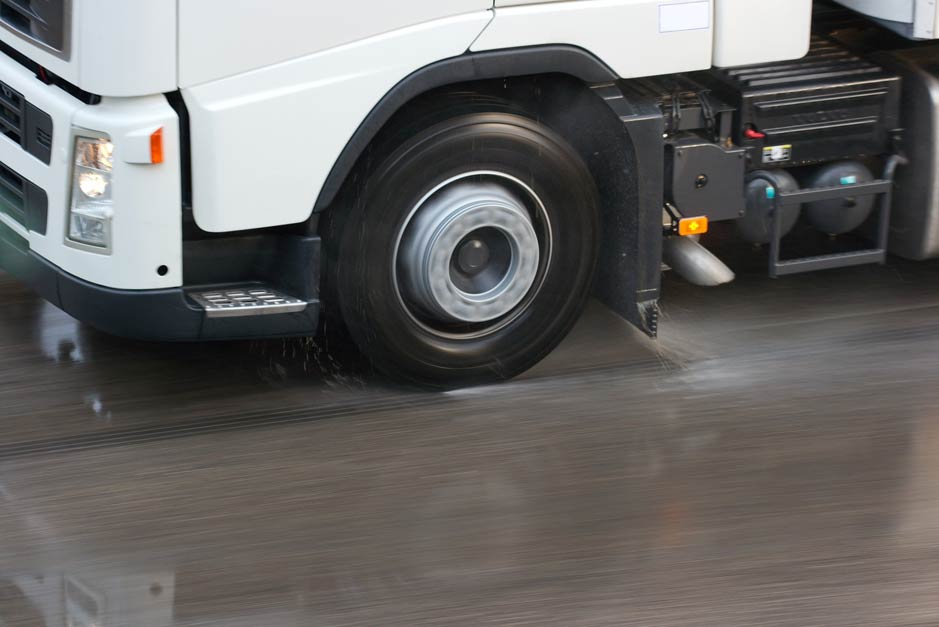
Basic checks such as making sure tyres are correctly inflated can make all the difference, as the pressurised air inside an HGV tyre has to support the weight of the vehicle and its load.
Why are tyres important?
In 2007, defective or under-inflated tyres were a contributory factor in the death of 43 motorists in the UK, and played a part in a further 984 accidents. In the HGV sector, statistics recorded by VOSA reveal an MoT failure rate of 36.5 percent in 2007/8, with ‘condition of tyres’ ranking as the second most common failure defects . The VOSA statistics reveal that the percentage of failure defects attributed to tyres rose from 4.9 percent in 2006/7 to 5.6 percent in 2007/8 among HGV motor vehicles. Tyres are of fundamental importance to road safety as they provide the only contact a vehicle has with the road. Basic checks such as making sure tyres are correctly inflated can make all the difference, as the pressurised air inside an HGV tyre has to support the weight of the vehicle and its load. Tyres must also be well maintained in order to keep the vehicle stable as it travels around corners, work in harmony with the vehicle’s main suspension system and help the vehicle accelerate and brake effectively. TyreSafe aims to raise awareness of the importance of driving on safe and correctly maintained tyres among road haulage communities and commercial vehicle users.
I’m a Fleet Manager
What legislation should fleet managers be aware of? Poorly maintained tyres can cause commercial fleet managers a number of challenges ranging from a duty of care for their drivers and other motorists involved in a tyre failure incident, health and safety risks for those making roadside wheel changes through to vehicle downtime, premature tyre wear and higher fuel consumption. Fleet operators have a duty of care to their drivers and must ensure they are provided with a safe working environment, including the provision of safe and roadworthy vehicles. Since the Health and Safety Offences Act came into force in January 2009, UK courts have greater authority to prosecute businesses for committing offences such as fitting illegal tyres or faulty brakes. The maximum penalty has increased from £5,000 to £20,000. Duty of care Not only is the safety of the fleet’s own drivers put at risk from a tyre failure, but other motorists can also be put at risk by any debris left on the carriageway. Furthermore, as any tyre fitter can testify, fitting a replacement tyre on a motorway hard shoulder is an activity fraught with risk and danger. Correct tyre maintenance can greatly reduce these risks and provide a safer working environment for drivers and fitters.
I’m a Driver
What regulations apply to truck drivers? Drivers can benefit from taking more time over tyre maintenance. Not only do they risk heavy fines and penalty points by driving on illegal tyres, they put themselves and other road users at risk by driving on tyres with insufficient tread depth to brake safely in the wet. Similarly, adopting a responsible attitude towards correct tyre inflation helps to ensure driver safety. If the tyres on your vehicle are under-inflated before you set off, arrange for them to be inflated. When a tyre is under-inflated, the tyre contains insufficient air to support the weight of the vehicle properly, which adversely affects acceleration, braking and cornering. Over-inflated tyres can also reduce the handling quality of the vehicle and cause high wear in the centre of the tread. Drivers are also under greater pressure to ensure their vehicle is roadworthy following the introduction of new legislation allowing the Vehicle and Operator Services Agency (VOSA) officers and the police to issue fixed penalties at the roadside. The charges vary depending on the type and frequency of the offence and can reach £200 per offence. Tyre tread depth will feature highly among the major criteria for vehicle roadworthiness.
I’m a Workshop Manager
What should workshop managers look out for when a truck comes into the workshop? Commercial vehicle workshops can play their part in helping to keep truck drivers and other road users safe on the roads and reducing the number of HGV MoT test failures by checking a vehicle’s tyres thoroughly when it enters the workshop.
I’m a Fleet Inspector
What should fleet inspectors look out for in terms of damage and wear? Fleet inspectors can play their part in helping to keep truck drivers and other road users safe on the roads and reducing the number of HGV MoT test failures by checking a vehicle’s tyres during the course of a routine fleet inspection. A list of the major causes of truck tyre damage and wear can be found here.

